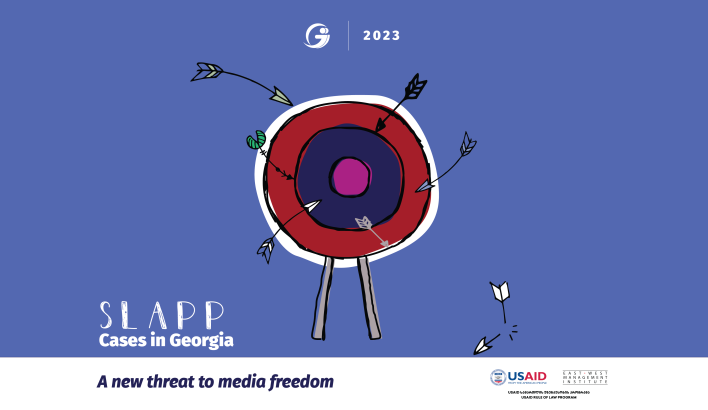
GDI publishes the special Report on SLAPP cases in Georgia.
Legal disputes initiated by high-ranking political officials, members of the Georgian Dream, and others related to them on the grounds of defamation have recently become one of the tools for the restriction of media freedom. According to the observation of Georgian Democracy Initiative (GDI), in 2021-2023, the so-called attacks against critical media and human rights defenders initiated and significantly increased the tendency to address the Courts with SLAPP (Strategic Litigation Against Public Participation) lawsuits. A SLAPP represents an apparently groundless defamation lawsuit initiated by politically or financially influential entities/individuals. The aim of these lawsuits is not to protect honor, dignity, or company reputation but to silence publicly active citizens and create financial barriers for them. However, SLAPPs also have a “chilling effect” beyond individual cases, undermining the development of a healthy and pluralistic environment where citizens can exercise civil initiatives.
Considering the above, this report aims to investigate the practice of coordinated, strategic litigation directed against civil society organizations and journalists operating in Georgia, the purpose of which is to suppress civil engagement. The report examines the legal features connected to SLAPPs, the legal status of human rights defenders and journalists, and the jurisprudence of SLAPP cases in Georgia. To this end, the report is based on the examination of the results of the strategic litigation conducted by GDI in the general courts, the experience accumulated within the said litigation, the analysis of Georgian and foreign legislation, and the case law of the European Court of Human Rights. The report is largely based on cases heard in the general courts between January 2021 and April 2023. According to GDI, at this stage, no less than 38 defamation cases are being reviewed in the general courts. Currently, GDI provides legal assistance to the media and journalists in 12 ongoing cases. Based on the analysis of the aforementioned cases, it is clear that most of these disputes have similar characteristics, suggesting their systematic campaign nature. It is noteworthy that among them:
around 31.5% of disputes are initiated by city mayors; 13% - are by MPs; 13% - are by ministers/heads of state agencies; 8% - are by police officers; 26% - are by persons/institutions allegedly connected to “Georgian Dream”;
56% of the claimants in these disputes demand excessive moral damages from the defendants with the intention of creating significant financial barriers for them;
defendants in 92% of lawsuits are three critical media (Mtavari Arkhi, TV Pirveli, and Formula) and journalists working in these TV Companies.
Notably, the trend toward the increased number of SLAPP disputes is even more alarming considering the approach adopted by the general courts. The judges virtually do not discuss and ignore the dangers inherent in such disputes to civil engagement. As a result, they take no notice of the existing standards for the protection of freedom of expression in Georgia and rule in favour of groundless claims.
The report elaborates on the approach adopted by the Courts. These have been identified after multivariate observations of SLAPP disputes. These are as follows:
General court judges show a heightened interest in lawsuits filed by people connected to the government and hear them in unusually speedy, tight time frames;
The general courts ignore the statutory provision regarding the allocation of the burden of proof and place it on the defendants;
While assessing the apparent groundless nature of the lawsuit, the Courts approach the issue formally and do not examine the plaintiffs’ underlying intentions for pursuing lawsuits initiated on the grounds of defamation;
The Courts do not maintain a balance between the right to privacy and freedom of expression when delivering decisions;
The Courts do not discuss the existence of grounds for termination of the disputes in question properly;
In the course of SLAPP disputes, the general courts in certain cases do not give the participating parties an equal opportunity to present evidence, which may represent a violation of the principle of adversarial proceedings and equality of arms;
The Courts fail to take into consideration the measures taken by journalists before publishing disputed statements and, in many cases, oblige them indirectly to disclose a confidential source;
The Courts do not absolve defendants from liability despite the existence of legal provision (qualified privilege) and do not discuss the contribution of contested statements to the development of a democratic society;
Irrespective of the legal provision, which considers media owners as appropriate defendants in defamation disputes, judges hold individual journalists responsible as well and thus do not discuss the issue of improper defendants;
The Courts award large amounts of moral damages to defendants.
The report was prepared by the Georgian Democracy Initiative (GDI) with the support of the USAID Rule of Law Program funded by the United States Agency for International Development (USAID) through the East-West Management Institute (EWMI). The views expressed in this report are the sole responsibility of the author and do not necessarily reflect the views of USAID and EWMI.
You can see the full version of the report here.
